Congressional Tax Writers Join NAM to Talk Tax Reform
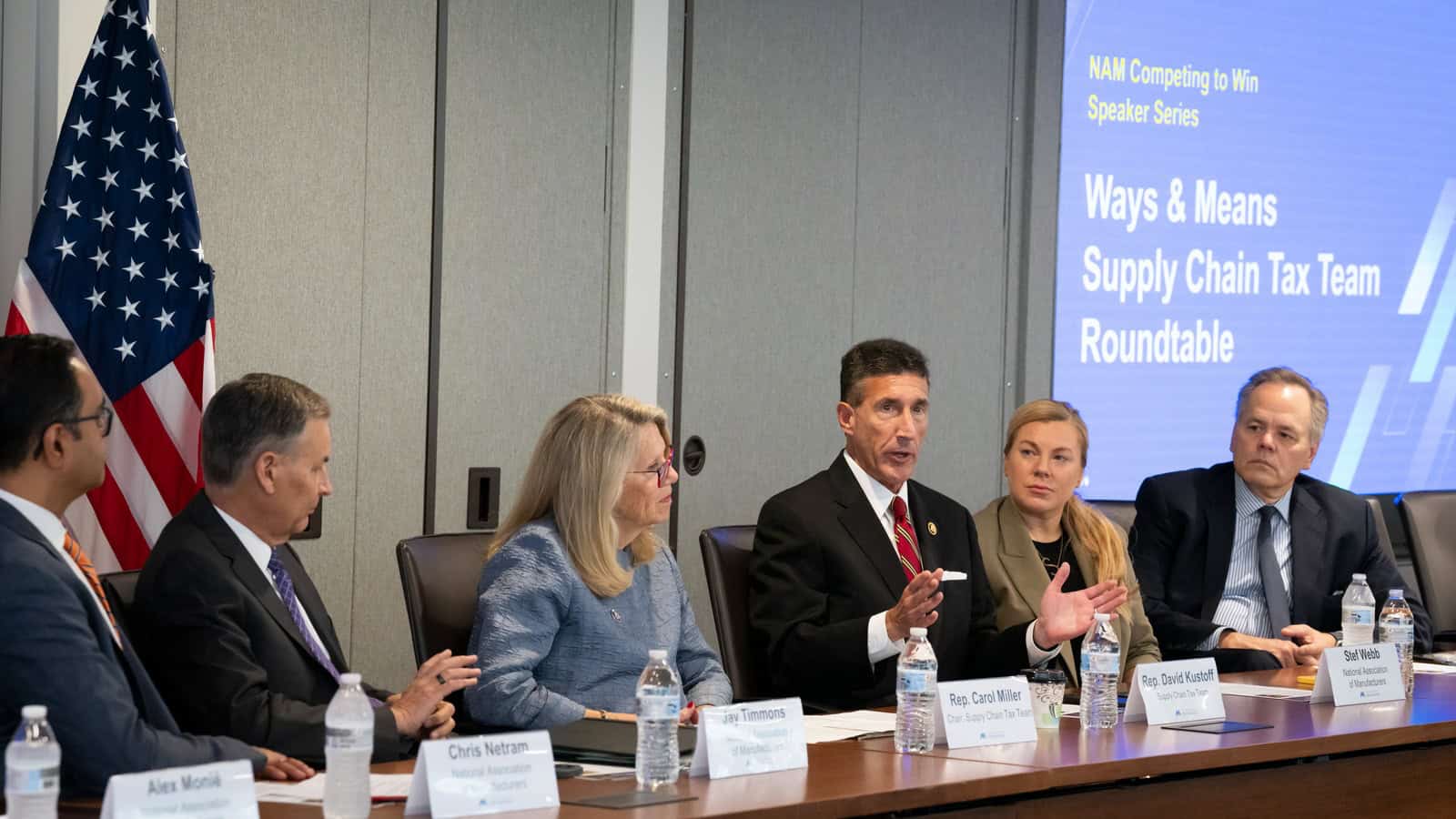
As part of its “Manufacturing Wins” campaign to preserve pro-manufacturing tax provisions, the NAM hosted a roundtable this week with Reps. Carol Miller (R-WV) and David Kustoff (R-TN)—respectively the chair and a member of the Ways and Means Committee Supply Chain Tax Team.
Preparing for 2025: The Supply Chain Tax Team has jurisdiction over the corporate income tax rate. Tax reform reduced the corporate rate to 21%, spurring the creation of thousands of new manufacturing jobs—and the NAM is working with Congress to ensure the U.S. maintains a competitive corporate rate as policymakers debate next year’s “tax Armageddon.”
Understanding the benefits: Rep. Miller emphasized that the dollars saved due to tax reform’s lower corporate rate have supported job creation, higher wages and the flourishing of local communities.
- As a business owner herself, she said she believes it’s important for members of Congress in charge of tax policy to understand the risks businesses take, the communities they support and the certainty they need to be successful.
Measuring the impact: Rep. Kustoff emphasized the importance of real-world data on the benefits of the lower corporate tax rate—from the number of jobs created to the work businesses have done to provide their employees with bonuses and higher wages.
- According to Rep. Kustoff, real-world metrics are important for educating policymakers about the need for action, as crucial, pro-manufacturing tax provisions are set to expire at the end of 2025.
Recognizing the ripples: The discussion also touched on the wider impact of tax increases on global supply chains and the broader U.S. economy.
- Participants noted that a higher corporate income tax rate’s ripple effects would hurt companies throughout the economy—even when those companies are pass-throughs and not explicitly affected by the corporate income tax rate.
- That’s because these small businesses often sell to and partner with larger corporations that would have less capital available under a higher corporate rate.
Our take: “Prior to 2017 tax reform, the U.S. had the highest corporate tax rate among the more than three dozen countries in the Organisation for Economic Cooperation and Development and the third highest in the entire world,” said NAM Vice President of Economic Policy Charles Crain.
- “That put manufacturers in America at an alarming disadvantage. A competitive tax rate helps business compete in the global economy, leads to job creation, investments and purchases of new equipment and allows manufacturers to give back to their communities.”
- “If Congress were to raise the corporate rate, it would force America to take a step back on the global stage—at a time when other countries around the world are implementing more competitive tax agendas.”
Estate Tax: A Q&A with Rep. Randy Feenstra
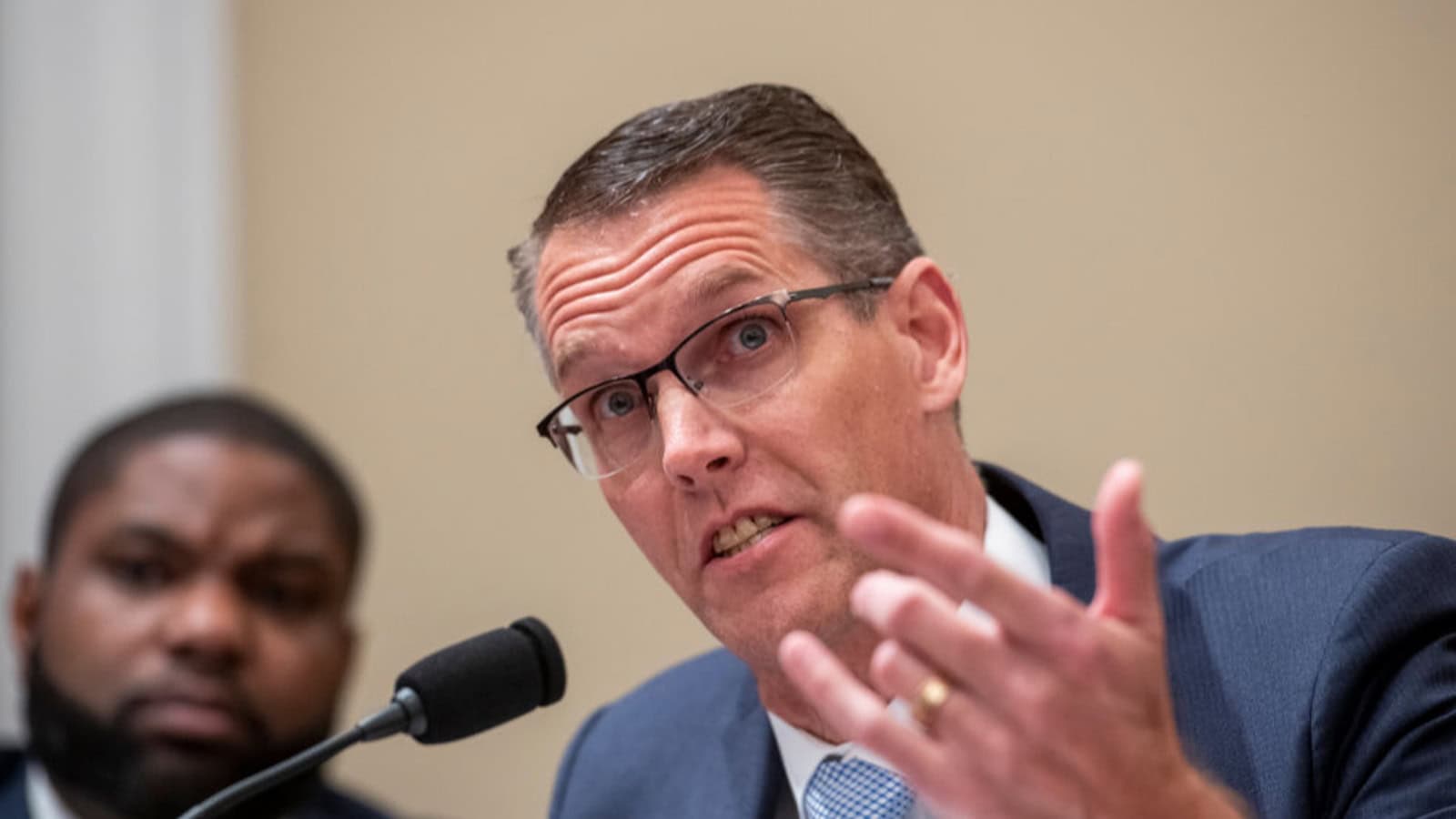
The NAM recently interviewed Rep. Randy Feenstra (R-IA), the vice chair of the House Ways and Means Committee’s Rural America Tax Team, about the estate tax and why he’s working with colleagues on Capitol Hill to repeal it.
NAM: Rep. Feenstra, Congress is facing a “Tax Armageddon” next year, as crucial provisions from 2017’s Tax Cuts and Jobs Act are set to expire. As a member of the Ways and Means Committee, what is your focus moving into next year’s debate?
Rep. Feenstra: One of those crucial provisions from the Tax Cuts and Jobs Act that is set to expire is the doubling of the estate tax exemption amount, which currently sits at $13.6 million in 2024. After 2025, it will return to half that amount, adjusted for inflation. That change in the Tax Cuts and Jobs Act was another important step toward full repeal of the estate tax, which my Death Tax Repeal Act would do. The bill makes the simple recognition that death should not be a taxable event. When a family is grieving, the federal government sends a multimillion-dollar tax bill as condolences. This is simply wrong.
I’m proud to co-chair the Rural America Tax Team, which has dug into this issue of the “death tax” and the impact it is having on family businesses across the country. As the tax team has spoken to family businesses and estate tax experts from across the country, it’s become increasingly clear that we still have a lot of work to do to provide relief from what can be a devastating setback for multigenerational family businesses. Repealing this tax is going to be one of my top priorities in 2025, and I’m proud to have the support of 170 of my colleagues.
NAM: The estate tax is imposed on family-owned businesses when ownership of the business passes to the next generation following the death of an owner. As you mentioned, the TCJA doubled the exemption threshold, excluding more assets from taxation and thus reducing the burden of the estate tax on businesses. Why is this important and what is Congress doing to preserve this higher threshold?
Rep. Feenstra: Over the years, various bills have taken steps toward providing relief for taxpayers hit by the death tax. The Tax Cuts and Jobs Act was one of the largest expansions of that relief, significantly reducing the number of family businesses hit by the tax and reducing the tax burden for those businesses that still are. People often don’t realize that businesses over many generations can accumulate assets that can put them over the asset threshold, but that doesn’t mean these businesses have a lot of cash on hand. So when they’re hit with millions in new taxes, that can sink an already cash-strapped business. Fortunately, because of the doubling of the exemption amount, far fewer businesses face that threat. As long as any family business does face that threat, we still have work to do.
NAM: At the end of 2025, the estate tax is scheduled to be reduced by half, subjecting more of family-owned manufacturers’ assets to taxation and increasing their estate tax liability. As the Ways and Means Committee and tax teams continue meeting with businesses around the country, what are you hearing on the impact this change would have?
Rep. Feenstra: Two things: A lot more people would be hit by the death tax, and the people who are hit would be paying a much higher tax. These are small family businesses we are talking about, and if the current exemption amount is allowed to return to half its current value, that means the size of the businesses getting hit are much smaller than they are today. People often think of farms, and that’s certainly true, but as you know, manufacturers are hit, family-owned restaurants, auto dealers, you name it. As we go into 2025, we need to be focused on policies that support growth and help these businesses succeed, not create costly obstacles for them to overcome. If the exemption amount falls to its pre–Tax Cuts and Jobs Act level, that’s a lot of new businesses that are going to be hit by this tax.
The Estate Tax, Explained

Congress should preserve tax reform’s changes to the estate tax, protecting family-owned manufacturers from tax increases scheduled for the end of 2025, according to a new explainer published by the NAM as part of its “Manufacturing Wins” tax campaign.
The background: In 2017, tax reform doubled the value of assets that could be exempt from the estate tax, a levy imposed on family businesses upon the death of their owners, when proprietorship passes to the next generation.
What’s going on: This valuation threshold is scheduled to be cut in half at the end of 2025, subjecting more assets of family-owned manufacturers to taxation and increasing these companies’ tax liability.
Why it’s important: A bigger tax burden would threaten the continued existence of family-owned companies and make it more difficult to pass family businesses on to the next generation.
- These firms could be forced to liquidate operation-critical assets, such as facilities and equipment, in order to pay the estate tax.
- An increased estate tax bill could mean that family-owned manufacturers are forced to take on debt, limit operations, reduce employee headcount or close entirely following the death of a loved one.
What else is at risk: Some legislators have floated the idea of repealing or limiting stepped-up basis, which stops a business owner’s heirs from being forced to pay capital gains taxes on asset appreciation that took place while the owner was alive.
What must be done: “Congress must preserve tax reform’s increased estate tax exemption threshold and maintain stepped-up basis,” said NAM Vice President of Domestic Policy Charles Crain.
- “Protecting family-owned manufacturers from the estate tax will prevent these small businesses from incurring costly and damaging tax bills that threaten their viability following the death of a loved one.”
Rep. Johnson Talks Tax Policy at Smurfit Westrock
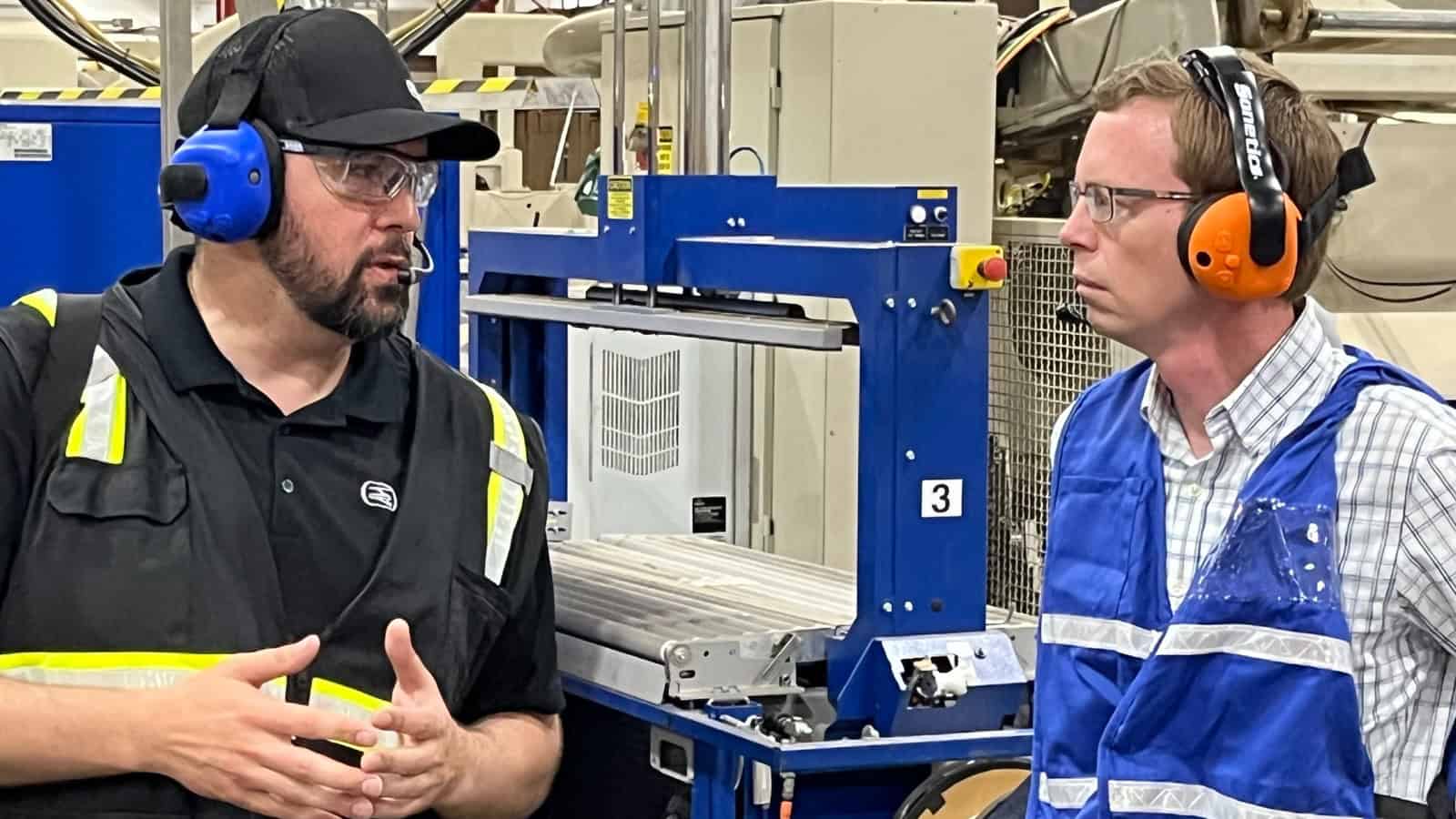
Rep. Dusty Johnson (R-SD) recently visited Smurfit Westrock’s facility in Sioux Falls, South Dakota, to speak with local business leaders and NAM representatives about the importance of maintaining pro-growth tax policies for manufacturers.
The tour: Smurfit Westrock Plant General Manager Gerald Loftin led Rep. Johnson through their state-of-the-art packaging facility, showcasing the company’s innovative solutions and highlighting its role as a major employer in the community, supporting local jobs and economic growth. Smurfit Westrock, a global leader in sustainable paper and packaging, operates in 40 countries with more than 500 packaging converting operations and 63 paper mills.
- “Smurfit Westrock’s success directly benefits the community, providing employment and contributing to the local economy,” Loftin said. “We are proud to be a part of this region and to support the growth and well-being of the area.”
The threat: NAM Vice President of Domestic Policy Charles Crain addressed the risks posed by expiring tax provisions. “Tax reform was rocket fuel for the manufacturing sector,” Crain explained. “It led directly to record levels of both job creation and wage growth in the years following the bill being signed into law.”
- Crain also emphasized the importance of preserving tax reform in full. “Essential tax reform provisions have already begun to expire—for example, full expensing, which has been crucial for our industry’s ability to invest in new equipment and expand operations, started phasing down last year,” Crain said. “Even more devastating changes are scheduled for 2025, the combination of which will significantly hamper manufacturers’ capacity to modernize and grow, directly impacting competitiveness and job creation.”
Calling on Congress: “Manufacturers are grateful to Rep. Johnson for supporting legislation earlier this year that would have revived immediate R&D expensing, a pro-growth interest deductibility standard and full expensing for capital investments,” Crain said. “We are looking to Congress for leadership and swift action as we work to prevent the harmful tax increases in store next year.”
Listening to manufacturers: Rep. Johnson emphasized his strong support for extending key tax provisions.
- “After seeing firsthand how these tax measures have benefited Smurfit Westrock and hearing about the negative impacts of their expiration, I’m more convinced than ever that we need to act swiftly to extend them,” he said.
- “Full expensing, R&D expensing and competitive tax rates are vital for the continued growth and innovation of our manufacturing sector. I’m committed to working with my colleagues in Congress to ensure we preserve these pro-growth policies before they expire, supporting jobs and economic development here in South Dakota and across the nation.”
The bottom line: “Extending the 2017 tax reform is not just a priority, it’s a necessity for maintaining America’s competitive edge in manufacturing,” Rep. Johnson concluded.
Get involved: Manufacturers interested in sharing their perspectives on tax reform with congressional leaders or hosting facility tours for U.S. legislators can find more information through the NAM’s “Manufacturing Wins” campaign.
NAM Member Testifies on Importance of Consistent Tax Policy before Ways and Means Committee
Washington, D.C. Today, Steve Sukup, President and CEO, Sukup Manufacturing Co., testified before the House Ways and Means Committee during a field hearing titled, “The Success of Pro-Growth, Pro-Worker Tax Policy in the American Midwest.”
Below please find his remarks as prepared for delivery:
Good morning Chairman Smith and to all the members joining us this morning.
Thank you for the opportunity to appear before you today at this important hearing. It’s a very special time for our community, and we are grateful to host you today.
My name is Steve Sukup, and I’m President and CEO of Sukup Manufacturing. We are located just up Interstate 35 in Sheffield, and I am proud to say that Sukup Manufacturing is the largest family-owned and operated manufacturer of grain storage, drying, and handling equipment.
For over sixty years, Sukup has been a critical part of the U.S. food supply chain here in the heartland. Our company is located in Congressman Feenstra’s district, and I’d like to thank him for being here today.
The tax reform bill of 2017 was a shot in the arm for manufacturers across our sector. Sukup has grown over the past several decades, but nothing compares to when the Tax Cuts and Jobs Act was signed into law.
For example, thanks to the lowering of the corporate rate to 21%, Sukup grew our workforce by a third, adding roughly 200 well-paying manufacturing jobs to our community.
The key to Sukup’s success has not only been our culture, but our dedication to creating and pushing our industry forward. Sukup has held over 100 U.S. patents. We are pioneering ways to make grain storage and drying more safe, profitable, and efficient for farmers and ranchers across the country.
This is largely made possible by our massive investments in research and development. In the years following tax reform, Sukup increased our R&D investment by several million dollars, with 95% of that money going towards engineering and staff wages, bringing well-paying jobs to Iowa.
One of these critical R&D investments is our Safe T Homes®. When a catastrophic earthquake struck Haiti in 2010, Sukup’s Safety Manager wanted to develop an efficient, quick-assembly home from one of our grain bins to provide relief. I encouraged him to build a prototype, and today, our Safe T Homes®, as you saw on the fair ground today, are changing lives worldwide.
We also developed the world’s largest 2.2-million-bushel bin for ethanol plants. That is big enough to house a Boeing 767, but yes, the landing is difficult.
Unfortunately, after being part of our tax code for seventy years, the expiration of immediate R&D expensing has made it harder for us to invest in the technologies and products of the future. Congress should reinstate the immediate expensing of R&D so manufacturers like Sukup can continue to innovate.
Following the passage of the 2017 tax law, Sukup went from roughly $5 million in capital spending to almost $15 million, thanks to 100% accelerated depreciation. This allowed us to fund new equipment purchases and fulfill our mission of providing Sukup employees with reliable, safe, and efficient equipment.
Unfortunately, full expensing began to expire in 2023. We believe that was a mistake, as it is common sense that our tax code should encourage investments that leads to growth.
Many manufacturing teams, including our company, would benefit from seeing this provision restored, and Congress should do so immediately.
An accountant once told me, if you don’t have debt, that means you’re not coming up with new ideas. Many manufacturers like us borrow funds to finance essential long-term investments.
Tax reform made it less expensive to take out business loans, which manufacturers use to invest and grow their operations. Unfortunately, this pro-growth standard expired in 2022 as well, making debt financing much more expensive.
We are also counting on you to preserve tax reform’s sensible changes to the estate tax, so that I can ensure the third and fourth generations of Sukups can continue in our family business.
Discussing tax policy before Congress is something of tradition in our family. About 20 years ago, my father Eugene Sukup testified before the Senate Finance Committee, along with Warren Buffett.
Since then, thanks to tax reform, we have had an incredible growth streak in our business, and every one of our employees and customers has benefited. I urge you to help us keep that growth streak going. Maintaining the 21% corporate rate, as well as the tax provisions I just described, is so important to manufacturers everywhere.
Because of these policies, we’ve been able to not only maintain our business, but to provide a great living, health benefits, and soon expanded childcare for our employees and the community—even as we aid those in need around the globe.
Again, thank you for being here today, and thank you for looking at ways to keep Sukup Manufacturing a rural Iowa success story.
-NAM-
The National Association of Manufacturers is the largest manufacturing association in the United States, representing small and large manufacturers in every industrial sector and in all 50 states. Manufacturing employs nearly 13 million men and women, contributes $2.89 trillion to the U.S. economy annually and accounts for 53% of private-sector research and development. The NAM is the powerful voice of the manufacturing community and the leading advocate for a policy agenda that helps manufacturers compete in the global economy and create jobs across the United States. For more information about the NAM or to follow us on Twitter and Facebook, please visit www.nam.org.
Corporate Tax Rate: A Q&A with Rep. Carol Miller

The NAM recently talked to Rep. Carol Miller (R-WV), the head of the House Ways and Means Committee’s Supply Chain Tax Team, about how raising the corporate tax rate would “devastate” manufacturers, and what she and her colleagues in Congress are doing to keep it where it is.
NAM: Rep. Miller, Congress is facing a “Tax Armageddon” next year, as crucial provisions from 2017’s Tax Cuts and Jobs Act are set to expire. As the leader of the Ways and Means Supply Chain Tax Team, what is your focus moving into next year’s debate?
Miller: In all the meetings I have with Fortune 500 companies, small businesses and stakeholders, it’s clear that the corporate rate is top of mind for everyone. We are all concerned that if the corporate rate is raised from 21%, consumers will be hit the hardest by the rising prices of everyday goods and services. I know for capital-intensive industries like mining, having a consistent tax rate is essential. I’m also focused on how energy tax credits are implemented and making sure that the government isn’t picking winners and losers by their rulemaking. During the reauthorization, my Supply Chains Tax Team will be evaluating the various energy credits currently in law to see what works and what needs tweaking.
NAM: Prior to 2017, the United States’ corporate tax rate was 35%, the highest in the OECD and third-highest in the world. Tax reform lowered the rate to 21%, aligning the U.S. with the average rate elsewhere in the OECD. What does it mean for Congress to protect this lower rate, and what would happen if it goes up?
Rep. Miller: If the corporate rate goes up, it would be devastating for every American, from the small business owner to the CEO who is trying to expand their business. The corporate rate rising means there will be higher prices while the U.S. struggles to compete on the global scale. The best thing we can do in Congress is cement the corporate rate at 21%—or better yet, lower it even more—through the TCJA reauthorization in 2025.
NAM: In 2018, the year the 21% corporate rate took effect, manufacturers created more than 260,000 jobs (the best year for job creation in 21 years) and increased wages by 3% (the best year for wage growth in 15 years). What else is the Supply Chain Tax Team seeing on the impact of the corporate tax rate as they visit with businesses around the country?
Rep. Miller: We’ve only seen positive impact from the corporate rate being lowered. When the pandemic hit and the markets were falling due to uncertainty and instability, the lower corporate rate gave companies more flexibility to help their employees and keep costs low instead of paying the government sky-high taxes. The lower corporate rate protected jobs, helped produce more economic growth and makes all the difference for American families who are struggling with inflation. Furthermore, the lower rate led to higher federal revenues since companies were able to expand and invest so heavily following the passage of the Trump Tax Cuts.
NAM: Thank you for being a champion for manufacturers across the country. What can our members do to stay involved and be a resource for your tax team’s work?
Rep. Miller: Spread the word to those who might not know why the corporate rate is so important. The majority of Republicans are on the same page about this, but some think that in order to bring down inflation, you need to raise taxes on businesses. That is not true. Prices only go down if costs for companies go down, and the corporate rate is an effective way to do that while simultaneously boosting the American economy.
Rep. Miller: Keep Corporate Tax Rate Low

Unlike many other pro-growth tax reform provisions, the corporate tax rate isn’t set to expire at the end of 2025, but some policymakers and President Biden have proposed increasing it.
The NAM recently talked to Rep. Carol Miller (R-WV), the head of the House Ways and Means Committee’s Supply Chain Tax Team, about how raising the corporate tax rate would “devastate” manufacturers, and what she and her colleagues in Congress are doing to keep it where it is.
“Devastating for every American”: Raising the corporate tax rate from its current, competitive 21% rate would be ruinous, Rep. Miller said. She’s focused on preventing that from happening.
- “If the corporate rate goes up, it would be devastating for every American, from the small business owner to the CEO who is trying to expand their business,” Rep. Miller told us. “The corporate rate rising means there will be higher prices while the U.S. struggles to compete on the global scale. The best thing we can do in Congress is cement the corporate rate at 21%—or better yet, lower it even more—through the [2017 Tax Cuts and Jobs Act] reauthorization in 2025.”
- Prior to tax reform, the U.S. had the highest corporate tax rate in the Organisation for Economic Co-operation and Development at 35%, and the third-highest rate in the entire world, harming America’s ability to attract manufacturing investment.
The effect of 21%: Rep. Miller emphasized that the U.S. economy has “seen only positive impact from the corporate rate being lowered.”
- “When the pandemic hit and the markets were falling due to uncertainty and instability, the lower corporate rate gave companies more flexibility to help their employees and keep costs low instead of paying the government sky-high taxes,” she went on. “The lower corporate rate protected jobs, helped produce more economic growth and makes all the difference for American families who are struggling with inflation.”
- In 2018, the year the 21% rate took effect, manufacturers created more than 260,000 jobs and were able to raise wages by 3%, the fastest pace in 15 years.
What manufacturers can do: To help preserve the 21% corporate tax rate, manufacturers should be vocal about its importance to the U.S. economy.
- “Spread the word to those who might not know why the corporate rate is so important,” Rep. Miller concluded. “Some think that in order to bring down inflation, you need to raise taxes on businesses. That is not true. Prices only go down if costs for companies go down, and the corporate rate is an effective way to do that while simultaneously boosting the American economy.”
Get involved: The NAM’s “Manufacturing Wins” tax campaign gives manufacturers the opportunity to share their tax reform stories with policymakers. You can join the campaign at www.NAM.org/MfgWins.
Learn more: Our full interview with Rep. Miller is available here.
Timmons: Industry Resilient, but Action Needed
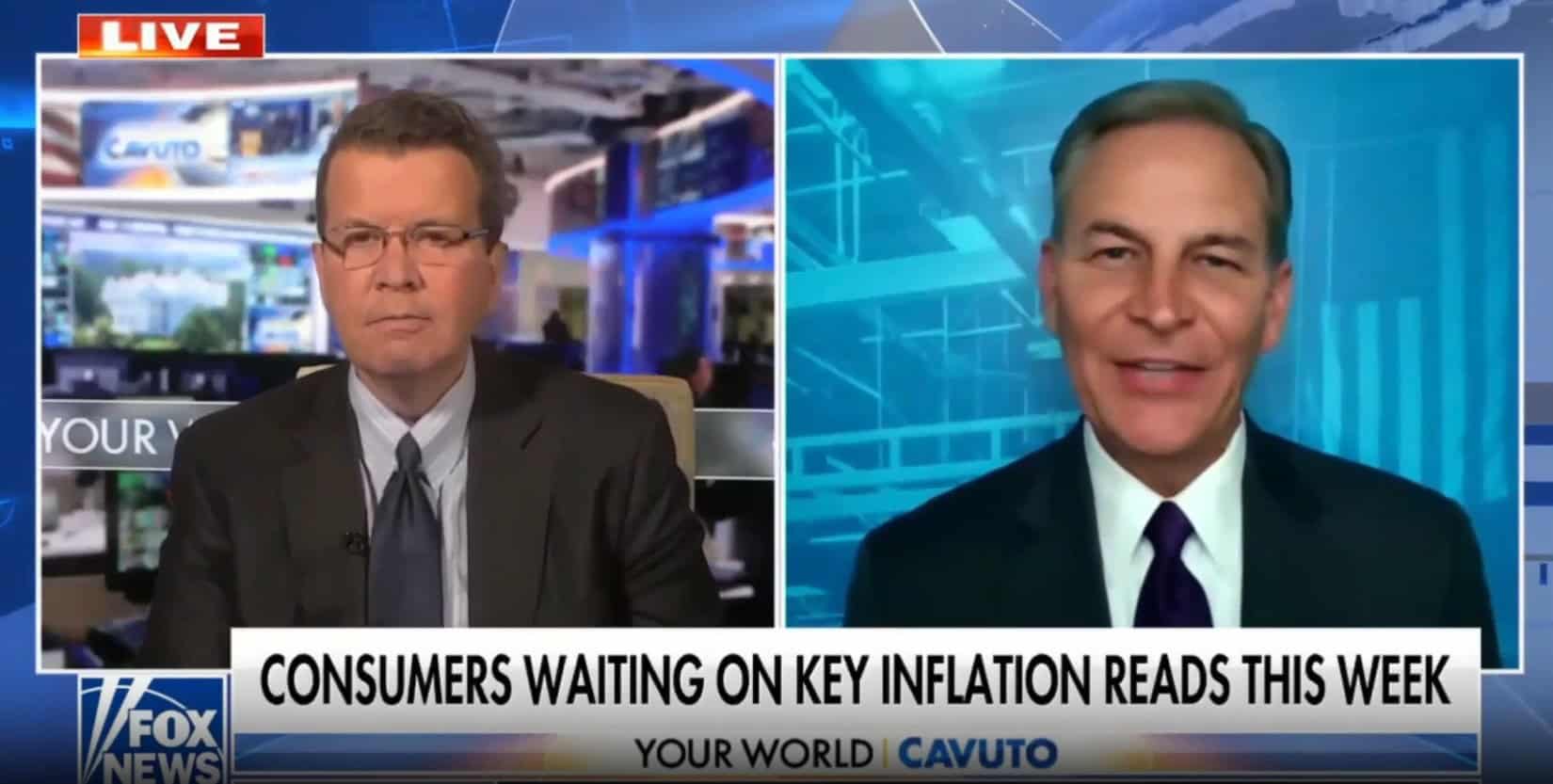
Despite mixed market signals in recent weeks, the U.S. economy is strong and manufacturing is resilient—but Congress must take certain steps to maintain the industry’s competitiveness, NAM President and CEO Jay Timmons told Fox News host Neil Cavuto Monday.
What’s going on: When lawmakers return from their August recess next month, they should prioritize several tax provisions, Timmons said.
- “When … Congress goes back, we’ve got to deal with interest deductibility, and we’ve got to deal with the research-and-development tax deduction,” he continued. “We’ve got to deal with full expensing. Those are things that have expired.” These measures and others are top priorities in the NAM’s tax campaign, Manufacturing Wins.
- Other manufacturing-critical tax provisions are scheduled to expire or be reduced drastically at the end of next year, including the pass-through and estate-tax deductions. What’s more, “candidates on both sides of the aisle … are talking about raising taxes on businesses,” Timmons said. Individual tax rates and tax rates on manufacturers that operate globally are also set to rise at the end of 2025.
Regulatory onslaught: Manufacturers are also struggling with a “regulatory burden that is driving up the cost of doing business,” Timmons told Fox News.
- “We have restrictions on our ability to develop energy sources here, and we have a ban on exports of natural gas. All of those things lead to potential downsides in the economy.”
- The vast majority of Americans support exporting natural gas, a March NAM poll found, but the Biden administration’s indefinite pause on permits to export liquefied natural gas, imposed in January, continues.
Hopeful outlook: “There is a … very positive sense among manufacturers that if we do the right things on the policy front, we’re going to continue [the] expansion in the sector,” Timmons added. “We’re going to continue the record investments that we’ve seen, the record job growth and the record wage growth in the sector.”
The Corporate Tax Rate, Explained
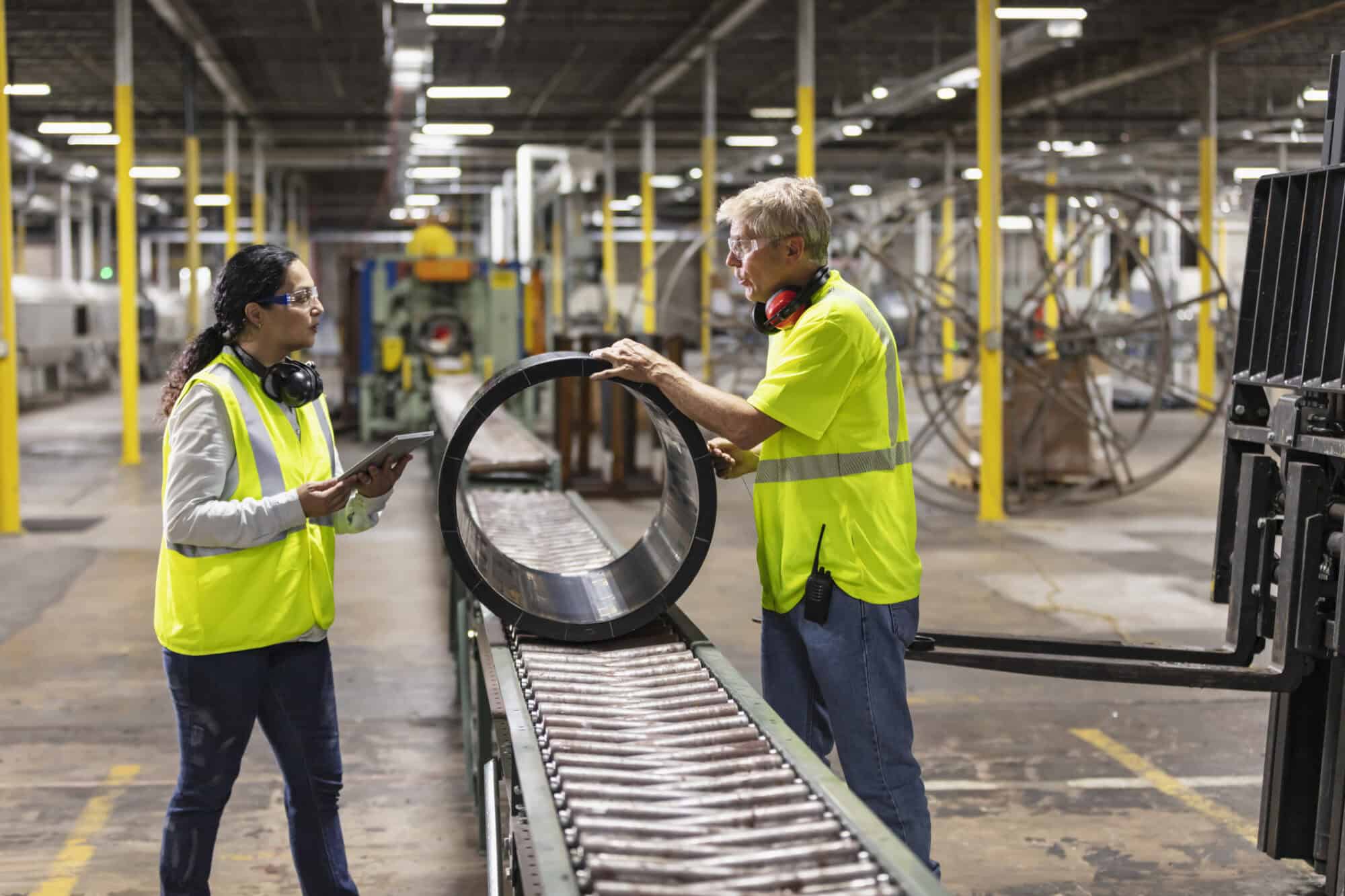
The NAM’s 2025 tax campaign, “Manufacturing Wins,” is focused on preserving tax provisions critical to manufacturing in the U.S. One of those is the corporate tax rate, which the 2017 tax reform lowered from 35% to a globally competitive 21%.
The NAM recently released a tax explainer on the current corporate rate, emphasizing why it’s crucial to U.S. manufacturing’s competitiveness on the world stage.
The background: Prior to 2017, the U.S. corporate tax rate was 35%, the highest among our peers in the Organisation for Economic Co-operation and Development and the third-highest rate in the entire world—making the U.S. an outlier and harming its ability to attract manufacturing investment.
- Tax reform lowered the corporate rate to 21%, aligning the U.S. with the average rate elsewhere in the OECD.
The benefits: Reducing the tax burden on manufacturers led to increased investment throughout the U.S., job creation, wage growth and overall economic expansion.
- In 2018, the year the lower rate took effect, manufacturers had their best year for job creation in more than two decades, creating more than 260,000 positions and increasing wages by 3%—the fastest pace in 15 years.
- NAM surveys conducted prior to tax reform found that nearly 80% of manufacturers were struggling with unfavorable business conditions like high taxes—a figure that dropped to just 12% following the reduction in the corporate rate.
What’s at stake: Although the corporate tax rate is not set to expire at the end of 2025, as other pro-growth provisions are, President Biden’s fiscal year 2025 budget called for an increase to 28%.
- This proposal would return the U.S. to one of the highest corporate tax rates in the developed world, resulting in fewer jobs, lower wages, less innovation and reduced investment in our communities.
What should be done: “Manufacturers are calling on Congress to preserve tax reform in its entirety—including the 21% corporate tax rate,” the NAM said.
- “Congress should maintain a globally competitive corporate rate—enabling manufacturers to continue leading on the world stage while driving innovation and job creation here at home.”
Tax Bill Scheduled for Thursday Vote
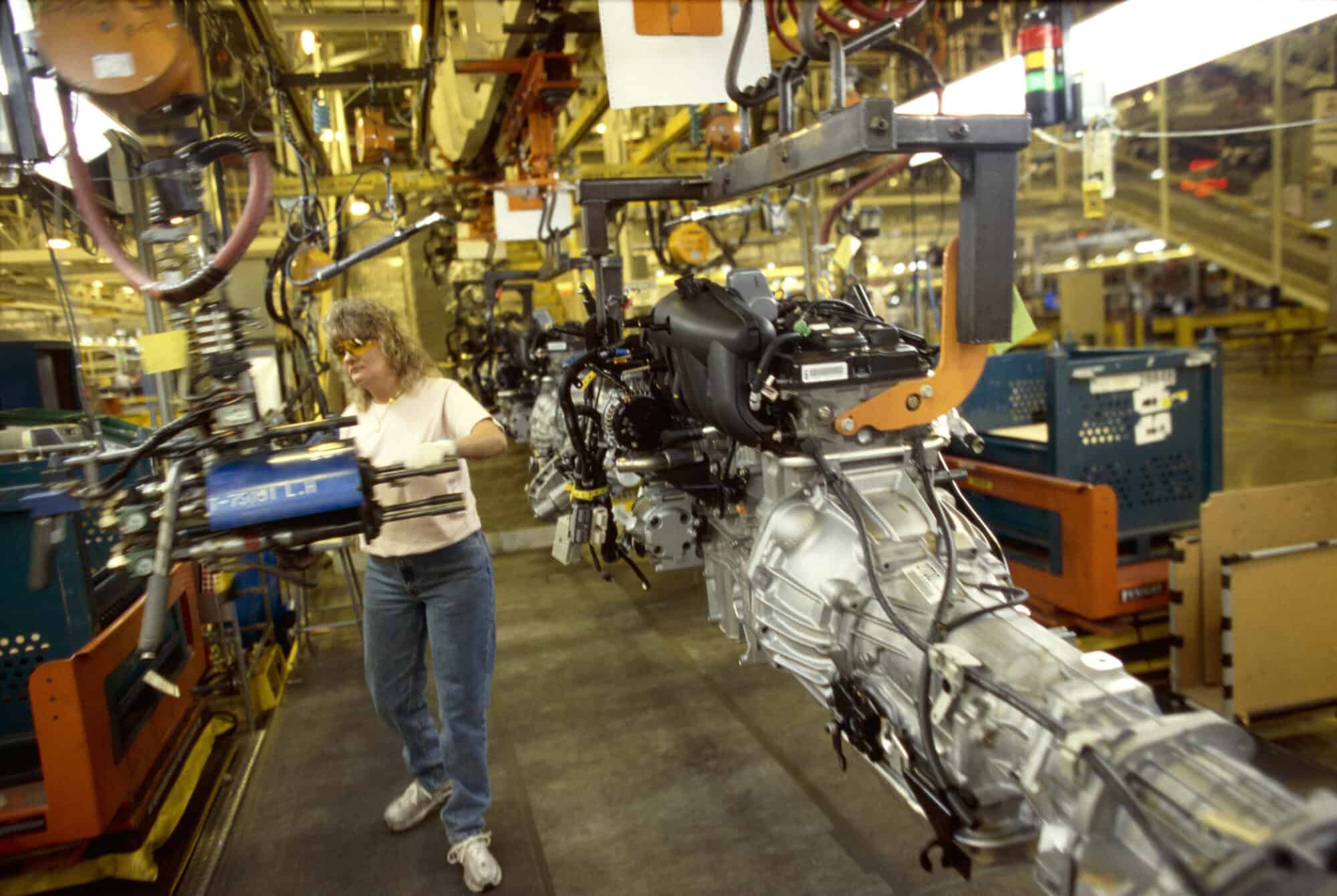
Senate Majority Leader Chuck Schumer (D-NY) has scheduled a procedural vote on a bipartisan tax package, though the bill’s fate remains uncertain.
What’s going on: The Tax Relief for American Families and Workers Act would restore expired tax policies that reduce the cost of manufacturers’ investments in R&D, equipment and machinery. Ahead of Thursday’s vote, the NAM called these policies “vital to manufacturing workers and America’s economic future.”
- Immediate R&D expensing: Prior to 2022, manufacturers in the U.S. could fully deduct their R&D expenses in the year those expenses were incurred. But in 2022, first-year R&D expensing expired, making R&D investments significantly more costly, particularly for small and medium-sized manufacturers.
- Enhanced interest deductibility: Also in 2022, a new standard took effect limiting the amount of interest manufacturers can deduct on business loans, making it more expensive for them to invest in growth and expansion.
- Accelerated depreciation: In 2023, 100% accelerated depreciation—which allows manufacturers to immediately expense the full value of their capital equipment purchases—began phasing down, meaning these vital investments are now more costly for manufacturers.
What to expect: Thursday’s procedural vote requires 60 votes in the Senate, a difficult hurdle.
What’s next: Immediate R&D expensing, enhanced interest deductibility and 100% accelerated depreciation are top priorities in the NAM’s 2025 tax agenda. As Congress prepares to address scheduled expirations of other policies from the 2017 tax reform next year, the NAM will continue to call for restoration of these important pro-growth incentives.
The last word: “Competitive tax policy is critical to manufacturers’ ability to compete on the world stage and create jobs here at home,” said NAM Vice President of Domestic Policy Charles Crain. “Congress should restore expired pro-growth tax policies and act to prevent even more devastating tax increases scheduled for 2025.”
